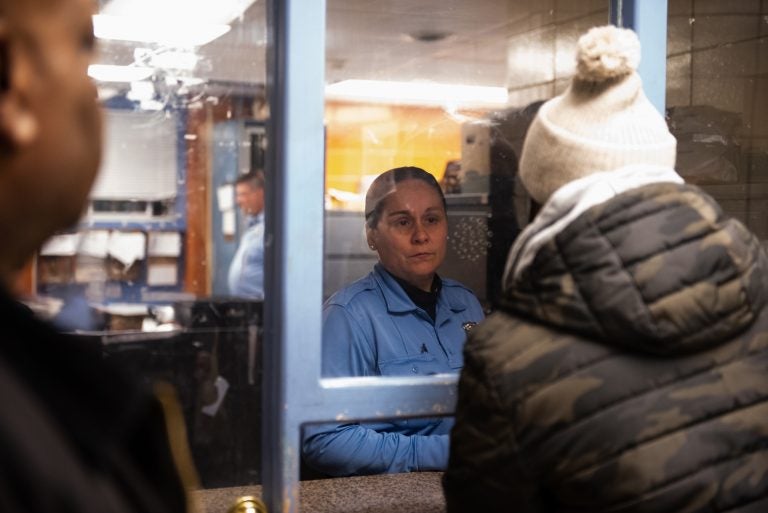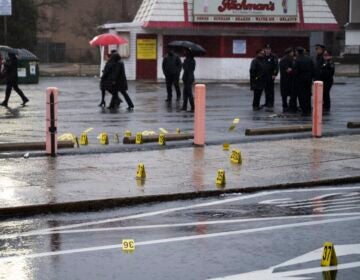City devotes $4.4 million to ‘holistic’ anti-violence programs
Mayor Jim Kenney is devoting more than $4 million to fighting gun violence as a public health crisis.

Officer Toledo from the 35th Police District informs James Shuler and other members of the Community Crisis Intervention Program that there have been no recorded instances of violent crime for the day. (Kriston Jae Bethel for WHYY)
Mayor Jim Kenney announced on Thursday that the city would dedicate more than $4 million to “interrupting” violence on neighborhood streets.
Flanked by Philadelphia Police Commissioner Richard Ross, members of City Council and anti-violence advocates, Kenny introduced a set of new programs that will focus on gun violence as a public health problem. He said the city would seek to promote a more data-driven and “holistic” approach to stanching the city’s rising homicide rate.
“Violence has plagued Philadelphia for generations. We are doing everything we can to change that … But we must change the mindset that policing is the only way to get this done,” Kenney said. “Violence is only a symptom of a larger crisis of pervasive poverty in Philadelphia.”
As part of this initiative, Kenney indicated that his administration would devote $4.4 million over the next six months to advance several of these efforts, including beefed-up prisoner re-entry programs and more community-focused approaches, such as “violence interrupter” teams that have found success across the country.
“What we did was look at comprehensive, holistic, trauma-informed approaches,” said Chantay Love, a crisis response expert and program director from the anti-violence nonprofit Every Murder Is Real. “Every life is too important. We hurt together, we heal together, we live, we grow, we succeed, and we are powerful.”
The new investment and shifting focus are the product of a new five-year anti-violence plan, developed over 100 days following a September “call to action” issued by Kenney in response to the rising rate of gun deaths. The city recorded 351 homicides in 2018, the highest total in more than a decade. The increase in murders has come even as the city’s overall crime rate is on the decline.
The plan, which notes that 75 percent of assailants and victims are black men between 16 and 34, recommends directly connecting at-risk individuals with prevention programs and focusing resources on the most violent neighborhoods.
Additional funding would be forthcoming in the next fiscal year, Kenney said.
Ross also detailed a complementary policing strategy, “Operation Pinpoint,” to focus on identifying and directly contacting high-risk individuals to pre-empt violent interactions. The approach borrows many aspects from a past experiment with “focused deterrence” in South Philadelphia, in which police and the city district attorney’s office used the threat of probation for minor crimes to dissuade gang members from committing more serious offenses.
However, Ross indicated Operation Pinpoint would differ, in part, because District Attorney Larry Krasner is not currently involved with this expanded effort.
“Focused deterrence cannot be done without the district attorney,” he said.
Krasner was elected amid a wave of criminal justice reform sentiment, and, while criminologists say focused deterrence programs can be effective, critics contend they fuel mass incarceration. Spokesman Ben Waxman said the district attorney’s office had only recently been briefed on the plan.
The office “was briefed earlier this week on the city’s plan. As an independent, elected office, we have our own set of roles and responsibilities in the criminal justice system, but we absolutely are not opposed to any portion of the plan,” Waxman said, adding that the office looks forward to continued work with city officials on violence reduction.
Council President Darrell Clarke indicated his support for these new strategies and funding. He blamed rising homicide numbers on a younger generation of unscrupulous criminals.
“This is a different type of violence. This is is a different breed,” he said.
WHYY is your source for fact-based, in-depth journalism and information. As a nonprofit organization, we rely on financial support from readers like you. Please give today.





